Shaping Tomorrow’s Stay: Exploring Hotel Interior Design Trends with Barbara Bischoff
In the ever-evolving world of hospitality, hotel interior design trends play a pivotal role in defining a guest’s experience. To gain valuable insights into these trends we spoke with Barbara Bischoff, a respected Project Designer at WATG and Wimberly Interiors, known for her innovative design approach. Barbara also serves as the Director of Student Relations at NEWH, showcasing her commitment to nurturing emerging talents in the field.
Within this article, Barbara generously shares her expertise, guiding us through the most prominent design trends. These trends encompass the fusion of ‘hotel meets apartment and office lifestyle’, as well as the intriguing interplay between artificial intelligence and the human touch, a dichotomy that is significantly reshaping the guest experience.
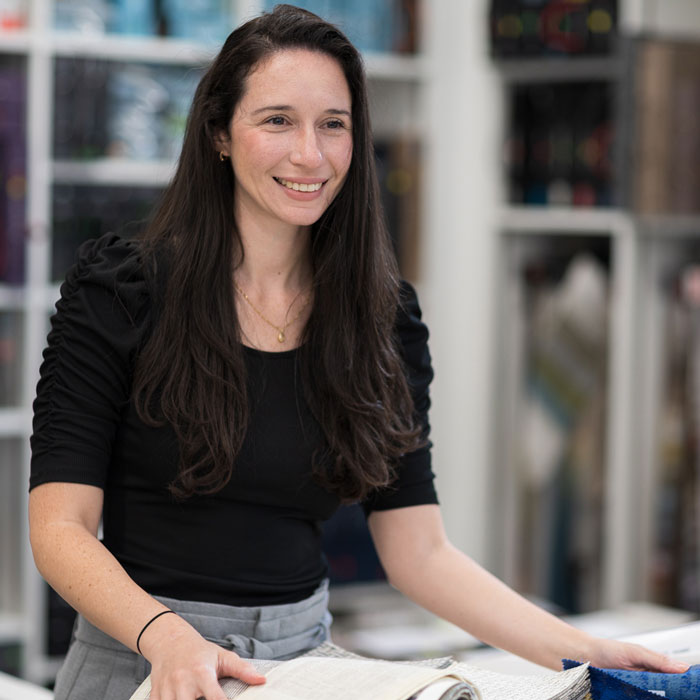
Barbara Bischoff, Project Designer at WATG and Wimberly Interiors. NEWH Director of Student Relations
Please could you introduce yourself and your role?
Hello, my name is Barbara Bischoff, and I am an interior designer specializing in hotel design and NEWH Director of Student Relations.
I currently work for Wimberly Interiors, a renowned design firm that focuses on creating exceptional and immersive experiences for hotel guests. As an interior designer, my role involves translating the clients’ vision into captivating spaces that seamlessly blend functionality, aesthetics, and a sense of place. With a passion for creating memorable environments, we introduce each hotel project with a unique blend of style and functionality.
What are the prominent changes currently being seen in the hospitality sector?
Hotel meets Apartment + Office lifestyle
In response to the effects of a post pandemic time, hotels have witnessed new guest habits, where the combination of short- and long-term stays has become increasingly popular. To make the most of this trend, hotels are starting to assess remote working trends and modify their public spaces to create a hybrid hospitality concept. Evolving into a hotel-stay meets apartment-living with an office efficiency approach, several hotels are incorporating rooms with kitchenettes and work-related zones, as well as offering coworking spaces and executive lounges in public areas. By embracing flexibility to the changing needs of guests, hotels can provide a seamless experience that serves to both living, work and leisure.
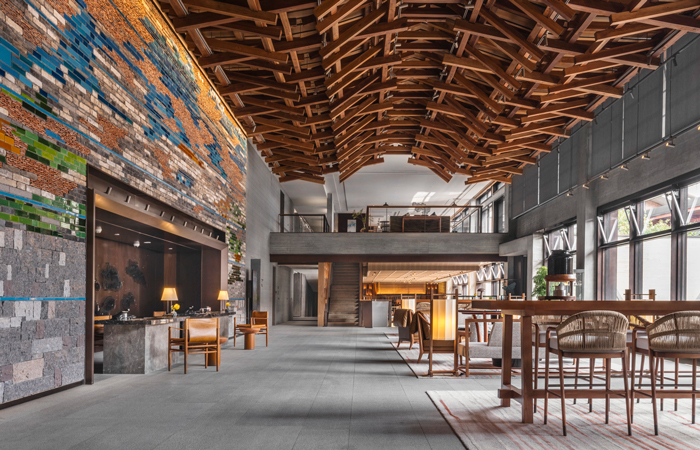
Yanbai Villa. Yanqi Lake, Beijing, China
What are the key challenges currently facing the UK and international hospitality sector?
Technology + Personalization
With the current technological landscape, where personalized experiences and tailored solutions have become the norm, the hospitality industry finds itself with the challenge to meet the expectations of today’s guests. The modern guest expects a curated hospitality experience that is finely tuned to their individual needs and desires, reflecting the era of personalized experiences ingrained in our daily lives.
As the industry attempts to master this delicate dance between catering to the individual and addressing the broader macro trends, hotels are faced with the task of redefining the art of hospitality by seamlessly blending personalized solutions with broader industry trends.
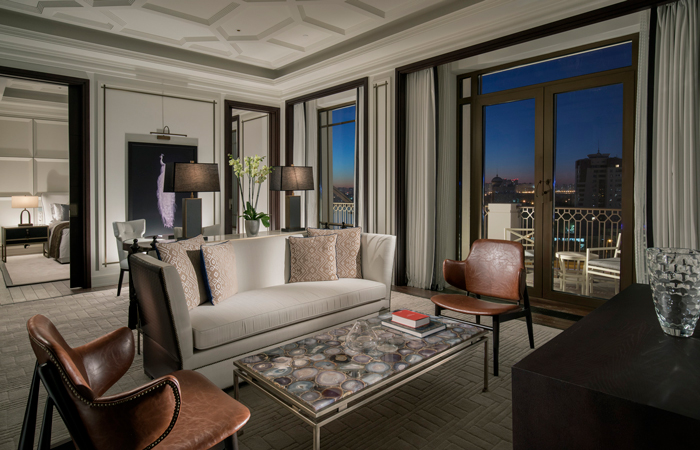
St. Regis Hotel & Residences Astana, Astana, Kazakhstan, Europe
Sustainability at the forefront
In the UK, the construction industry faces extreme pressure to meet the RIBA 2030 Climate Challenge towards reaching net zero. While the architecture industry is more advanced, the interior design sector has yet to catch up. To truly make progress, it is essential to arrange all stakeholders from hotel operators, manufacturers, to contractors and designers to shape a collective understanding of the target and outline a viable path forward.
Currently, the sustainability landscape is filled with green noise, making it increasingly challenging to navigate the complexities of sustainability. By setting clear objectives, fostering collaboration, and revealing the complexities, the interior design industry can plan a course towards a genuinely sustainable future. Together, we can navigate the noise, overcome the challenges, and pave the way for a more sustainable and responsible hospitality sector.
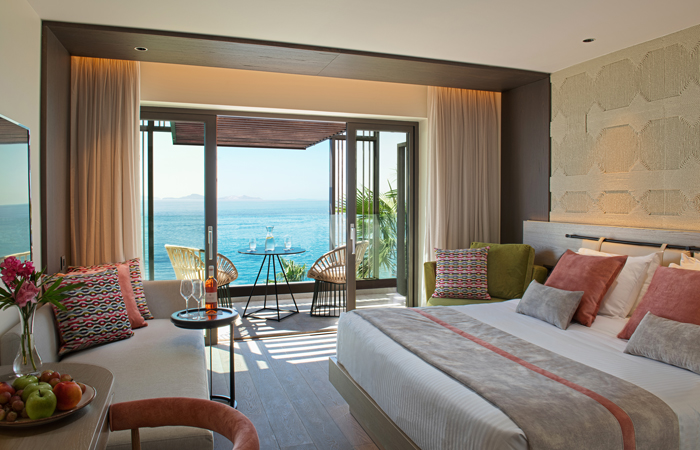
Mitsis Summer Palace, Kos, Greece, Europe
Are there are any hospitality interior trends which are particularly exciting?
AI vs the Human Touch
We must recognize that in the present year, AI is revolutionizing all industries, leaving an awe-moment impact in its wake. As the hotel industry continues to evolve, embracing the power of AI becomes a key step in delivering exceptional service, exceeding guest expectations, and staying ahead in a highly competitive market.
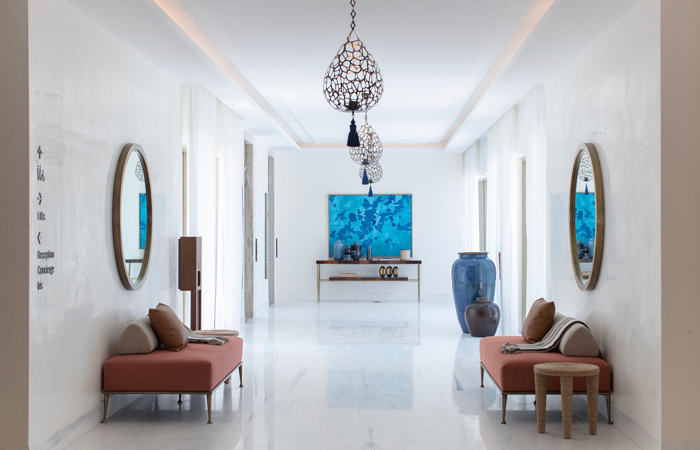
Fairmont Taghazout Bay, Taghazout, Morocco, Africa
Now, integrating such advanced technological tools without losing the much-needed human touch of the hospitality industry will be exciting to witness. While AI enhances efficiency and personalization, it is the genuine human connection that truly allows for a remarkable and enriching guest experience, forging lasting memories that transcend technological innovations.
The Locale
Within the post-pandemic era, the significance of locality has taken centre stage in the world of hospitality.
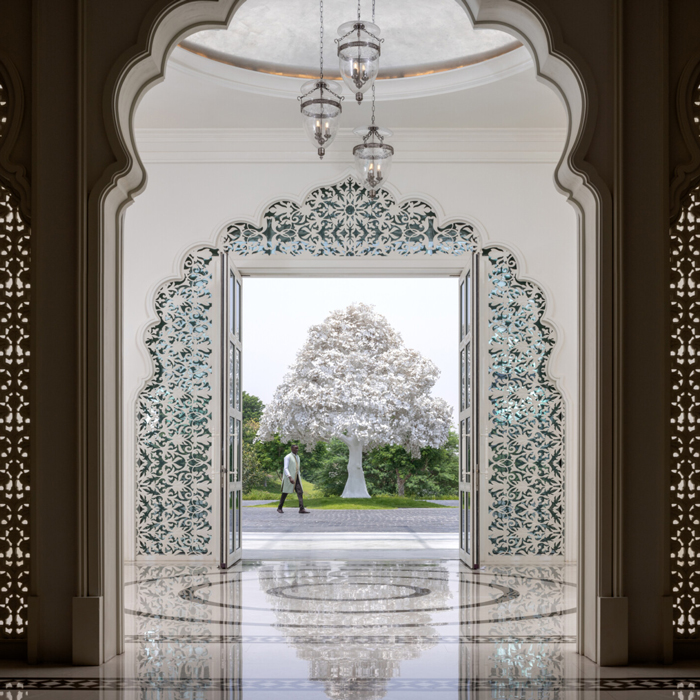
Chedi Katara, Katara Cultural Village, Doha, Qatar, Middle East
Travelers, more than ever, are seeking authentic and immersive experiences that reflect the essence of the destination they visit. Hotels must provide a spectrum of local adventures, culinary delights, engaging programs, and opportunities to connect with the vibrant community.
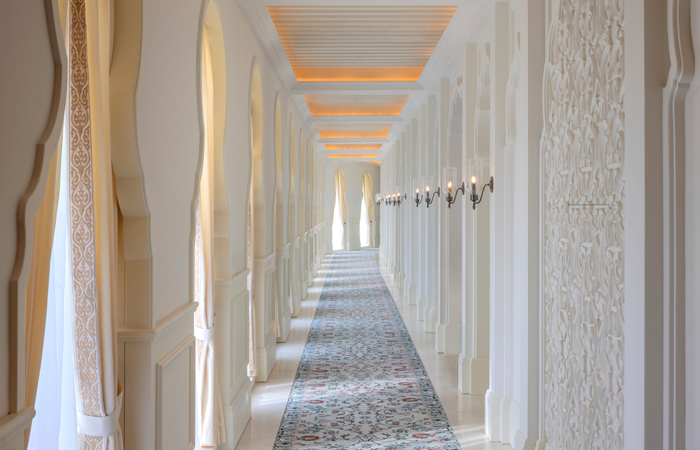
Chedi Katara, Katara Cultural Village, Doha, Qatar, Middle East
As the demands of guests evolve, hotels must ensure that every guest embarks on a journey of discovery, connecting with the essence of the destination and fostering meaningful connections with the local community.




